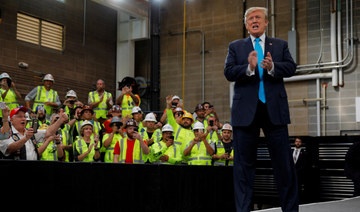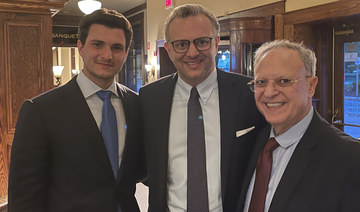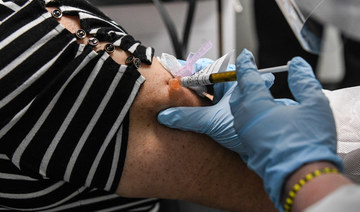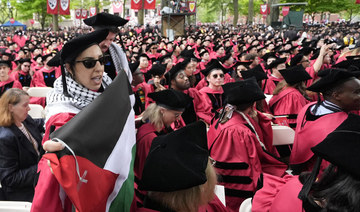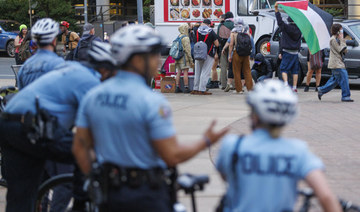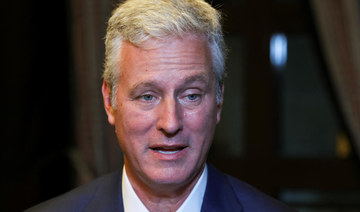KABUL/ISLAMABAD: Allegations over Russia’s and Iran’s deepening ties with the Taliban have ignited concerns of a renewed “great game” of proxy warfare in Afghanistan that could undermine US-backed troops and push the country deeper into turmoil.
Moscow and Tehran insist their contact with insurgents is aimed at promoting regional security, but local and US officials who are already frustrated with Pakistan’s perceived double-dealing in Afghanistan have expressed bitter skepticism.
Washington’s long-time nemesis Iran is accused of covertly aiding the Taliban, and Russia is back to what observers call Cold War shenanigans to derail US gains at a time when uncertainty reigns over President-elect Donald Trump’s Afghanistan policy.
Russia’s “narrative goes something like this: The Taliban are the ones fighting” Daesh, top US commander in Afghanistan John Nicholson said recently, denouncing the “malign influence” of external powers.
“This public legitimacy that Russia lends to the Taliban is not based on fact, but it is used as a way to essentially undermine the Afghan government and the NATO effort and bolster the belligerents. Shifting to Iran, you have a similar situation. There have been linkages between the Iranians and the Taliban.”
Russia has officially provided military helicopters for Afghan forces, but simultaneously propped up the Taliban with arms, official and insurgent sources say.
“We are particularly concerned about loads of Russian-made weapons recently seized from areas on the border with Tajikistan,” a senior Afghan security official told AFP.
“Cross-border support for the Taliban will further complicate the security situation in Afghanistan’s north.”
A Taliban commander told AFP that Russian support had helped the insurgents overrun the northern city of Kunduz in October for the second time in a year.
Taliban representatives in recent months have also held several meetings with Russian officials in Tajikistan and Moscow, sources say.
“No country should be in touch with destructive groups who are the enemies of Afghanistan. This shows disrespect toward the victims of war,” Interior Ministry spokesman Sediq Siddiqi told AFP. “We ask Russia and Iran to work with Afghans to defeat terrorism.”
Western diplomats in Kabul have privately voiced alarm that Russia is quietly filling its embassy ranks with Soviet-era “old-timers” well versed in Cold War tactics, as relations with Washington turn sour over the conflicts in Syria and Ukraine.
And this week Kabul vented fury over a summit between Russia, China and Pakistan in Moscow that agreed on a “flexible approach” to remove certain Taliban figures from sanctions lists.
Alexander Mantytskiy, Russia’s ambassador to Kabul, insists engagement with the insurgents is benign.
“We have ties with the Taliban to ensure the security of our political offices, consulates and the security of Central Asia,” he told reporters this month.
Lashing out at NATO, he said the allegations against Russia were an effort to distract attention from the worsening conflict and “put the blame for their failures on our shoulders.”
Some observers agree that Russian and Iranian concerns over Daesh terrorists cannot be dismissed lightly.
Daesh “may not have a deep presence in Afghanistan, but it has developed a profile there and its overall brand inspires great fear,” Michael Kugelman, an analyst at the Woodrow Wilson Center in Washington, told AFP.
“We can’t rule out the possibility that Russia and Iran are trying to hedge against the future possibility of a stronger (Daesh) in Afghanistan by expanding their ties to the Taliban.”
Afghanistan has long been used as a chessboard for proxy battles, from the 19th-century “great game” of rivalry between Britain and Russia, to the US funnelling weapons through Pakistan to Afghan rebels fighting Soviet forces in the 1980s.
It has also served as a proxy war playground for nuclear-armed rivals India and Pakistan, which is also accused of playing a “double game” by endorsing Washington’s war on terrorism while providing sanctuary to the Taliban.
Superpowers jockeying for supremacy in Afghanistan could sow further chaos amid the unpredictability of Trump’s foreign policy, analysts say. Trump has given surprisingly few details on how he will tackle America’s longest war.
“Russia is waiting to see the next US move when Trump takes over,” said Kabul-based analyst Ahmad Saeedi.
“If Trump chooses to scale back the US presence, then the Russians will be eager to fill the gap.”
As for Iran, many in Tehran fear that a potentially hawkish White House under Trump will try to scrap its landmark nuclear deal with world powers, pushing them to retaliate by deepening ties with the Taliban.
“Foregn powers fighting for their own self-interest does not bode well for Afghanistan,” said Saeedi. “That only means more violence and bloodshed in the country.”
Russia, Iran ties with Taliban stoke Afghan anxiety
Russia, Iran ties with Taliban stoke Afghan anxiety

Trump, without evidence, claims migrants in US illegally ‘building army’ to attack Americans
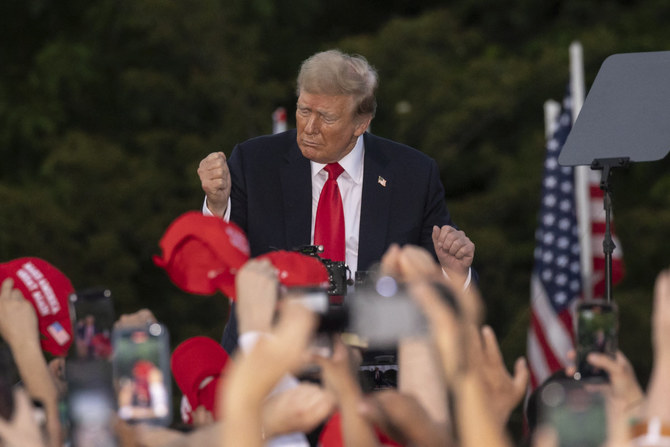
- He sought to portray migrants from China, the DR Congo and other countries as a violent threat, even as studies show immigrants are not more likely to engage in criminality
- Trump also sought to link the illegal entry of migrants from the Mexico border to the economic plight of Black and Hispanic voters, claiming that migrants were taking their jobs
NEW YORK: Republican presidential candidate Donald Trump claimed without evidence on Thursday that immigrants from Africa, the Middle East and elsewhere were “building an army” to attack Americans “from within,” once again using inflammatory rhetoric about migrants in the US illegally.
During a rally in the mainly Hispanic and Black neighborhood of New York City’s South Bronx, Trump sought to portray migrants from China, the Democratic Republic of the Congo and other countries as a violent threat, even as studies show immigrants are not more likely to engage in criminality.
“Almost everyone is a male and they look like fighting age. I think they’re building an army,” Trump said to a few thousand supporters who gathered to hear him in the South Bronx’s Crotona Park. “They want to get us from within.”
Throughout his campaign, Trump has repeatedly used incendiary language to accuse immigrants in the US illegally of fueling violent crime, calling them “animals” responsible for “poisoning the blood” of the country. As evidence, he points to individual instances of crimes, rather than aggregate data.
“We are not going to let these people come in and take our city away from us and take our country away,” Trump said, vowing to carry out “the largest criminal deportation operation in our country’s history” if re-elected to the White House.

Trump also sought to tie record levels of migrants caught crossing the US-Mexico border illegally with the economic plight of Black and Hispanic voters, arguing, without evidence, that migrants were taking their jobs.
Trump’s decision to speak in the Bronx was in part a matter of convenience. His campaign schedule has been crimped by his trial in New York on charges he falsified business records to hide a hush money payment to a porn star. In April, he made a campaign appearance at a convenience store in Harlem, New York.
Trump is locked in a tight race with Democratic President Joe Biden ahead of the Nov. 5 election. The Bronx rally was part of his effort to exploit Biden’s weakening support among Hispanic and Black voters.
Roughly 55 percent of Bronx County residents are Hispanic and about one-third are Black, and the crowd on Thursday was more racially mixed than his usual rallies, which are predominantly white.
Trump’s campaign had a permit for up to 3,500 people to attend the rally, the New York City Parks Department said.
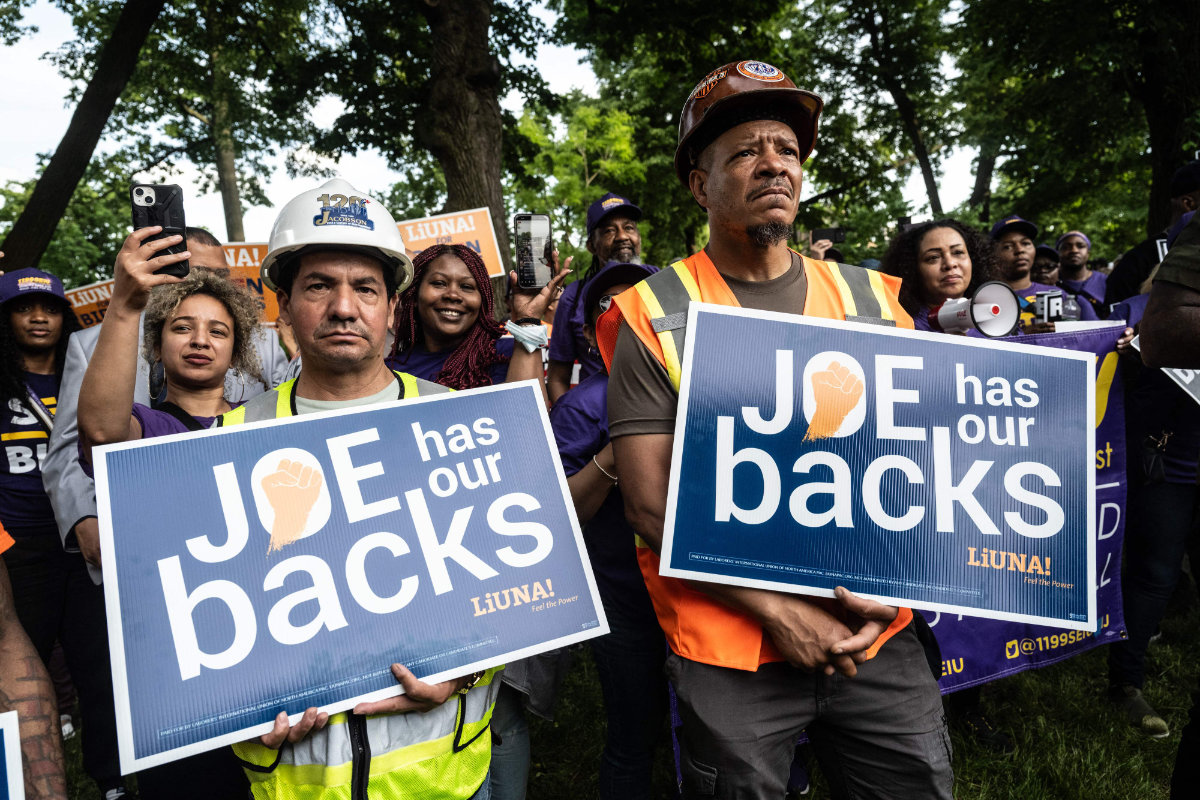
‘Historic’ rally in the Bronx
Recent polls suggest the Trump is gaining ground with Blacks and Hispanics, who were critical to Biden’s win in 2020. Trump strategists see a chance to grab enough of their votes to make the difference in swing states in November.
Biden has had a flurry of actions and events focused on bolstering support among African American voters. He has singled out Trump and other Republicans for attacking programs aimed at improving diversity, equity and inclusion, and on Thursday the president’s campaign released a pair of TV and radio ads criticizing Trump’s treatment of Black people.
Reuters interviewed nine Hispanic and Black rally attendees who said they will vote for Trump in 2024. Of the seven who were voting age in 2020, six voted for Trump. They cited the economy and immigration as their main reasons for supporting him.
“It’s historic that he’s here,” said Steven Suarez, 46, who is Puerto Rican, a reference to Trump being the first Republican presidential candidate to make a stop in the Bronx since Ronald Reagan in the 1980s. “He could have gone anywhere in New York City. He could have gone to Manhattan. He chose to come here.”
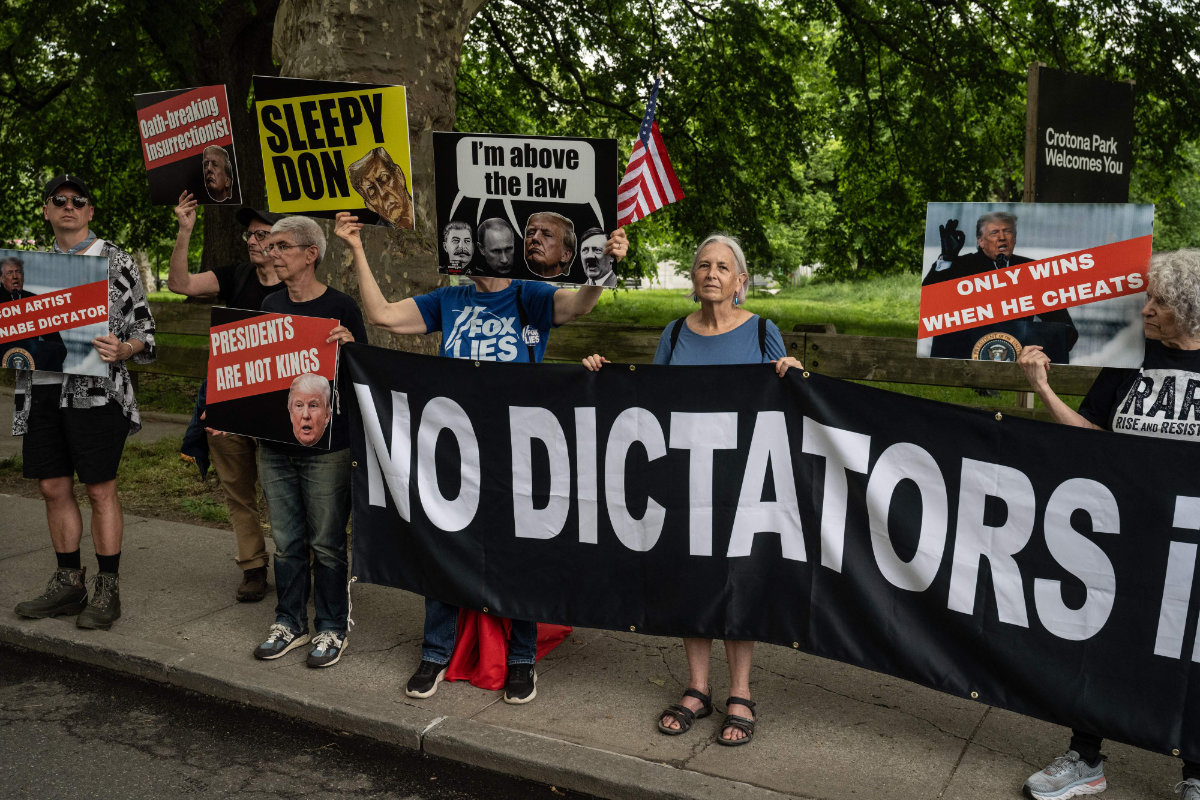
In a New York Times/Siena College poll in March, Trump was selected by 23 percent of Black and 46 percent of Hispanic respondents in a one-on-one matchup with Biden. That is far higher than the 12 percent of Black and 32 percent of Hispanic voters Trump won in 2020, according to Edison Research exit polls.
Political analysts have attributed weakening support for Biden among voters of color in part to the outsized impact of inflation on people living paycheck to paycheck.
Attending his first Trump rally on Thursday, Ed Rosa, 60, said he was a longtime Democratic voter but felt his vote for Biden in 2020 was a mistake. He said the Democratic Party had “become too socialist” and was not handling the economy or the southern border well.
Netanyahu will soon address joint session of US Congress, House Speaker Johnson says
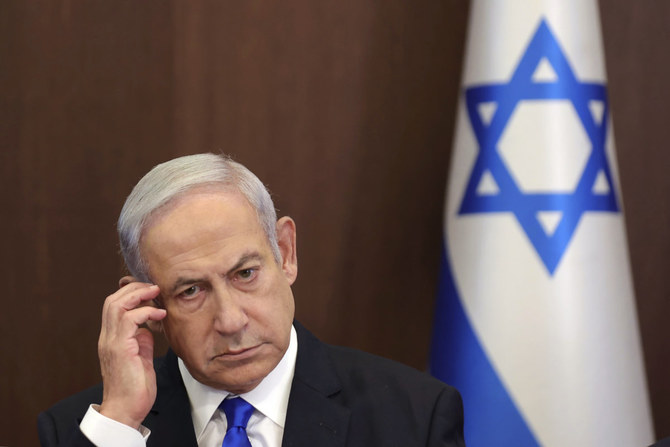
- Johnson made the announcement in a keynote speech at the Israeli embassy’s annual Independence Day reception
- The diplomatic gathering came amid strains between Biden and Netanyahu over a US push for Israel to do more to protect Palestinian civilians in the war against Hamas militants in Gaza
WASHINGTON: Republican US House Speaker Mike Johnson said on Thursday Israeli Prime Minister Benjamin Netanyahu would soon address a joint meeting of Congress amid heightened tensions with President Joe Biden over the Israeli leader’s handling of the war in Gaza.
Delivering a keynote speech at the Israeli embassy’s annual Independence Day reception, Johnson, the top congressional Republican and a critic of the Democratic president’s Israel policy, said it would be “a strong show of support for the Israeli government in their time of greatest need.”
Such a speech is sure to further anger some progressive Democrats critical of Israel’s military campaign in Gaza and Biden’s support for it. Netanyahu has closely aligned himself with Republicans.
The diplomatic gathering in Washington comes amid strains between Biden and Netanyahu over a US push for Israel to do more to protect Palestinian civilians in the war against Hamas militants in Gaza.
The embassy gave equal billing to Democratic US Representative Pete Aguilar, who shared the high-profile platform with Johnson at a more subdued event under the shadow of the Gaza war. “As Americans, we reaffirm our commitment to Israel’s sovereignty,” he said.
Speaking first, Johnson said to applause: “Tonight I’m happy to announce ... we will soon be hosting Prime Minister Netanyahu at the Capitol for a joint session of Congress.”
Successive US administration have usually sent a high-level official to the Independence Day receptions, reflecting Israel’s status as Washington’s top Middle East ally.
Vice President Kamala Harris, who in recent months has called the situation in Gaza a “humanitarian catastrophe” and has urged a ceasefire, delivered last year’s keynote, mostly extolling US backing for Israel.
An Israeli official said this year the embassy wanted to honor lawmakers in a bipartisan way with speaking roles in appreciation for congressional approval of billions of dollars in new US military aid to Israel.
The reception took place on the same night as a White House state dinner for Kenyan President William Ruto, which the Israeli official said created a scheduling conflict for administration cabinet members.
Several less senior Biden aides were in attendance, including Derek Chollet, Secretary of State Antony Blinken’s counselor.
Johnson's veiled swipe at Biden
Johnson and Aguilar both condemned the International Criminal Court prosecutor’s decision this week to seek arrest warrants for Netanyahu and his defense chief, Yoav Gallant. The prosecutor also asked for warrants to capture Hamas leaders responsible for the deadly Oct. 7 cross-border attack on Israel, which triggered the Gaza war.
Johnson took a veiled swipe at Biden, saying “some leaders” have sought to withhold “vital weapons” from Israel. Biden has paused one shipment of bombs and warned he could delay others if Netanyahu carries out an all-out ground offensive in the refugee-packed city of Rafah in southern Gaza. But the flow of weapons has mostly continued.
Security was tight around the National Building Museum in downtown Washington. One small group of pro-Palestinian protesters could be heard playing a loud recording accusing Israel of killing innocent civilians.
On Tuesday, Johnson said he was close to inviting Netanyahu, a right-wing leader who had warm relations with former President Donald Trump.
Johnson, a Trump ally, had issued Senate Majority Leader Chuck Schumer an ultimatum to sign a letter inviting Netanyahu to address a joint meeting or else he would have him only speak to the House of Representatives.
Schumer had signaled he was open to Congress hosting Netanyahu, despite declaring in March that the Israeli leader had “lost his way” and calling for new elections in Israel.
Johnson did not offer a date for Netanyahu’s speech. Addresses to Congress are a rare honor generally reserved for the closest US allies.
Netanyahu has already given such speeches three times, most recently in 2015. That year, Republican leaders invited him without consulting Democratic then-President Barack Obama, as Netanyahu joined them in an unsuccessful bid to derail Obama’s international nuclear deal with Iran.
Johnson, struggling to keep his fractious Republican House majority intact, has been a prominent voice in the US political divide over Israeli policy. Politicization of the issue has intensified ahead of the November election in which Biden is running against Trump.
In contrast to past years’ gala celebrations, this year’s reception, marking the 76th anniversary of Israel’s founding, was billed as a “solidarity event.”
Israel is fighting to wipe out Hamas militants who attacked Israel on Oct. 7, killing around 1,200 people and seizing 253 hostages, according to Israeli tallies.
Palestinian authorities say more than 35,000 people have been killed during Israel’s campaign in Gaza, many of them women and children.
HPV vaccines prevent cancer in men as well as women, new research suggests
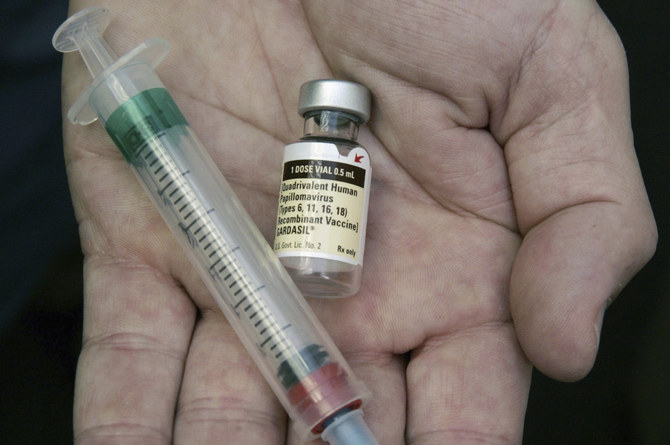
- For the study, researchers compared 3.4 million people of similar ages — half vaccinated versus half unvaccinated — in a large health care dataset
- Research suggests vaccinated men have fewer cancers of the mouth and throat — twice as common in men than in women — compared to those who didn’t get the shots
New research suggests the HPV vaccine is preventing cancer in men, as well as in women, but fewer boys than girls are getting the shots in the United States.
The HPV vaccine was developed to prevent cervical cancer in women and experts give it credit, along with screening, for lowering cervical cancer rates. Evidence that the shots are preventing HPV-related cancers in men has been slower to emerge, but the new research suggests vaccinated men have fewer cancers of the mouth and throat compared to those who didn’t get the shots. These cancers are more than twice as common in men than in women.
For the study, researchers compared 3.4 million people of similar ages — half vaccinated versus half unvaccinated — in a large health care dataset.As expected, vaccinated women had a lower risk of developing cervical cancer within at least five years of getting the shots. For men, there were benefits too. Vaccinated men had a lower risk of developing any HPV-related cancer, such as cancers of the anus, penis and mouth and throat.
These cancers take years to develop so the numbers were low: There were 57 HPV-related cancers among the unvaccinated men — mostly head and neck cancers — compared to 26 among the men who had the HPV vaccine.
“We think the maximum benefit from the vaccine will actually happen in the next two or three decades,” said study co-author Dr. Joseph Curry, a head and neck surgeon at the Sidney Kimmel Cancer Center in Philadelphia. “What we’re showing here is an early wave of effect.”
Results of the study and a second were released Thursday by the American Society of Clinical Oncology and will be discussed next month at its annual meeting in Chicago. The second study shows vaccination rates rising but males lag behind females in getting the HPV shots.
HPV, or human papillomavirus, is very common and is spread through sex. Most HPV infections cause no symptoms and clear up without treatment. Others develop into cancer, about 37,000 cases a year, according to the Centers for Disease Control and Prevention.
In the US, the HPV vaccine has been recommended since 2006 for girls at age 11 or 12, and since 2011 for boys the same age. Catch-up shots are recommended for anyone through age 26 who hasn’t been vaccinated.
In the second study, researchers looked at self- and parent-reported HPV vaccination rates in preteens and young adults in a large government survey. From 2011 to 2020, vaccination rates rose from 38 percent to 49 percent among females, and among males from 8 percent to 36 percent.
“HPV vaccine uptake among young males increased by more than fourfold over the last decade, though vaccination rates among young males still fall behind females,” said study co-author Dr. Danh Nguyen at the University of Texas Southwestern Medical Center in Dallas.
Parents of boys, as well as girls, should know that HPV vaccines lower cancer risk, said Jasmin Tiro of the University of Chicago Medicine Comprehensive Cancer Center who was not involved in the research. And young men who haven’t been vaccinated can still get the shots.
“It’s really important that teenagers get exposed to the vaccine before they’re exposed to the virus,” she said.
German police clear pro-Palestinian protesters from Berlin university
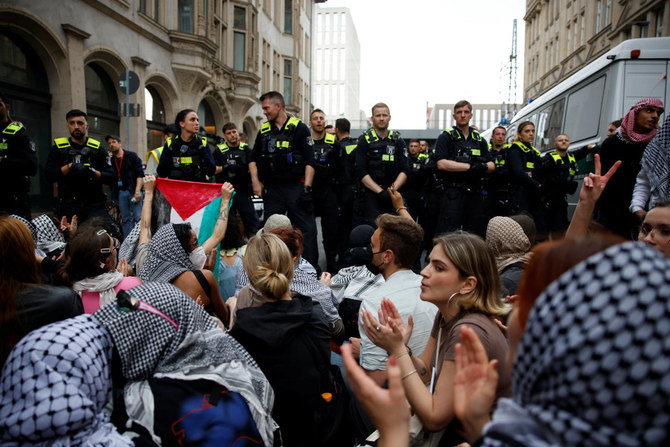
- Activists had occupied several rooms of the Humboldt University’s Institute for Social Sciences in downtown Berlin on Wednesday
BERLIN: German police cleared about 150 pro-Palestinian demonstrators from a Berlin university faculty on Thursday, ending one of a wave of student-led protests across Europe over Israel’s conduct in its war against Hamas.
Activists had occupied several rooms of the Humboldt University’s Institute for Social Sciences in downtown Berlin on Wednesday.
Student Coalition Berlin, the group which organized the protest, called in a statement posted on social media for the university to “take an active role in ending the genocide against the people of Palestine and their decades-long suffering.”
University administrators agreed after talks with protest leaders to let them stay until Thursday evening. But they called in the police when some of them refused to leave, German news agency dpa reported.
Police spokeswoman Beate Ostertag said that, while some of the demonstrators left voluntarily, police officers had to lead others from the building. Police said about 130 people were briefly detained during the operation, in which officers broke through several barricaded doors.
Student protests over the war in Gaza that began in the United States have spread to university campuses in many European countries. In Germany, protests have taken place this week at universities in cities including Munich and Leipzig.
Berlin authorities have taken a tough line against anti-Israeli demonstrations, urging police to step in if demonstrators use slogans that could incite hatred against Jews – taboo in a country marked by the memory of the Holocaust.
“There is no place for hate and anti-Semitism in Berlin and at our universities,” said Burkard Dregger, a lawmaker for the Christian Democratic Union, which leads the Berlin state government.
Promising pipelines and fracking, Trump rakes in millions at Texas fundraisers
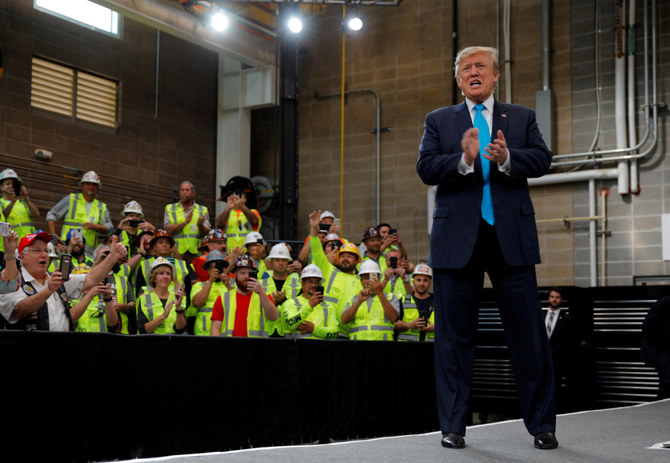
- While the oil and gas industry has boomed under Biden despite increased regulation, they are pushing back against Biden’s ban on fracking on federal land a recent halt in approving new gas export facilities
HOUSTON: Republican presidential candidate Donald Trump raised tens of millions of dollars during a fundraising swing through Texas this week, promising he would support the oil and gas industry by backing new pipelines and restoring fracking on federal land.
Trump has courted support from the energy industry with a pro-fossil fuel and anti-regulation agenda and regularly criticizes President Joe Biden’s policies to accelerate the energy transition toward a low-carbon economy.
The oil and gas industry has boomed under Biden despite increased regulation and the more climate-focused administration, making record profits and pumping more oil and gas than ever before. The industry has pushed back against Biden’s ban on fracking on federal land a recent halt in approving new gas export facilities.
A Houston fundraiser on Wednesday was hosted by oil billionaires Jeff Hildebrand, founder of Hilcorp Energy, the largest closely held US oil firm; George Bishop, founder of GeoSouthern Energy; Harold Hamm, founder of Continental Resources; and Kelcy Warren, head of pipeline firm Energy Transfer Partners.
Trump drew standing ovations when he promised to get more natural gas pipelines built if elected and to restore fracking to areas barred under Biden, said Mark Carr, a Houston entrepreneur who was in attendance. Many oil and gas pipelines were delayed or abandoned under both Trump and Biden’s administrations due to community opposition, legal challenges and lengthy permitting processes.
“He’s going to get energy going again in the United States,” said Carr, who founded the Houston-area Christian Brothers Automotive chain.
Trump said America needs to quit taking Venezuelan “tar” oil and instead use American oil, said another attendee, who declined to be named. The United States has resumed limited imports of Venezuelan crude under Biden for processing at US refineries.
Trump has emphasized tax cuts for the industry, “streamlining” the permitting process, and removing certain regulations, said donor and oil executive Dan Eberhart, who was in Houston for the event. “We can drill our way to energy security and low gas prices,” said Eberhart.
The Houston fundraiser was held by the Trump 47 Committee, a fundraising tie-up between the Trump campaign, the Republican National Committee, a fundraising group that has spent tens of millions of dollars on Trump’s legal fees, and a raft of Republican state parties. The Houston luncheon and a smaller, more intimate roundtable with a group of about 45 executives was followed by a fundraising event in Dallas on Wednesday night.
A Trump campaign official said the Texas swing brought in at least $15 million. Two sources told Reuters the various Texas events took in a total of around $40 million. Reuters was not immediately able to confirm that number.
After a raft of high-dollar donor events across the country, Trump overtook Biden in fundraising last month for the first time.
Meanwhile, the US Senate finance and budget committees on Thursday launched an investigation into Trump’s reported offer to roll back a slew of environmental regulations in exchange for $1 billion in campaign contributions.
The investigation came a week after the top Democratic lawmaker on a US House oversight panel sought information from nine oil companies about reports about “quid pro quo propositions” made by the former president at a campaign event this spring at his Mar-a-Lago resort in Florida.
The Texas events were pricy affairs: Host committee members were asked to pay $250,000 per couple and agree to raise another $500,000, according to the invitations. The chair was asked to donate about $845,000 per couple and raise another $1.69 million.
An after-luncheon roundtable drew Occidental Petroleum CEO Vicki Hollub and Houston entertainment and sports magnate Tillman Fertitta, who owns the hotel where the event was held. They were offered a question-and-answer period with the candidate.
Also in attendance in Houston was North Dakota Governor Doug Burgum, a former Trump rival for the Republican nomination and now a possible running mate, according to another attendee.
Teofilo Lingi, chief operating officer of EK-Petrol, said the former president was “good for the oil industry” and relations with Angola, where his trading and oil exploration company was founded.
Stricter environmental regulations since Trump’s term in office have “made it more difficult for us to import from Angola,” Lingi said, citing customs duties.


